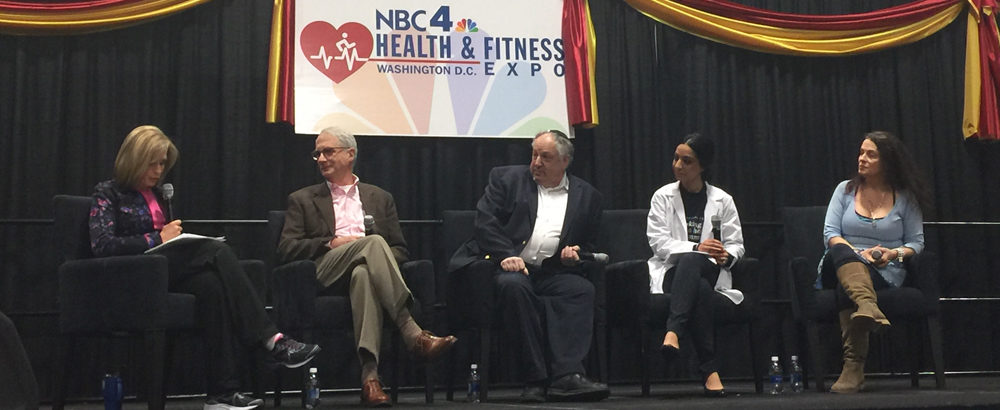A Q&A with Kaiser Permanente Sleep Expert Robert Dill
By Erin Meade
As part of our recent sponsorship at the NBC4 Health and Fitness Expo, Kaiser Permanente’s Robert Dill, M.Ed, LMFT, LPC, CSAC, shared his extensive knowledge about sleep with the more than 75,000 individuals in attendance.
Sleep is a critical component of total health. Unfortunately, according to the Centers for Disease Control (CDC), more than one in four Americans report occasional sleep problems, including one in 10 who experience chronic insomnia. Lack of sleep can worsen several chronic conditions, including diabetes, obesity, and depression.
At Kaiser Permanente, we offer our members a variety of options to understand the importance of sleep, as well as tools to improve their own sleep. We asked Dill to answer some common questions about sleep for those who weren’t able to attend the Expo.
Q: How much sleep does the average adult need?
A: There’s no definite answer – some people are okay with six, some people need ten. For most adults, seven to nine hours is the sweet spot.
Q: I wake up frequently in the night, and often can’t fall back to sleep. Help! What do you suggest?
A: First, I want to impress upon everyone that waking up is NORMAL. From the day we’re born, we sleep in cycles – just think about how babies sleep. Waking up is only a problem when we make it one, by looking at our phones, worrying about a big meeting the next day, getting annoyed that our partner is snoring like a freight train. When you wake up, remember that it’s normal and resist the urge to do anything. Try using the time for some mindful meditation, which can be as restful as sleeping.
If you find yourself having trouble falling back to sleep, try getting up and doing some gentle stretching. If you’re awake for more than 20 minutes, get out of bed for a bit. I discourage people from spending non-sleep time in bed.
Q: Sometimes, I wake up really early. Do the same techniques work?
A: They do, though I always say that if you feel rested, you should get up and start your day. The extra time is a great opportunity to exercise, read, or catch up on items on your to-do list. Don’t be a slave to your alarm clock – listen to your body.
Q: Interesting. I’ve heard that going to bed and getting up at the same time every day is a key to good sleep. Is that true? What about sleeping in to catch up on the weekends?
A: This is a key piece of getting good sleep. I suggest starting to unwind an hour or so before you go to sleep – turn off the television, put your phone away, and start unwinding your brain and your body. Again, some gentle stretching and mindful meditation are great ways to do this. Then, you get up at the same time every day – even on the weekends. It’s important to know the difference between being sleepy and being tired. Being sleepy doesn’t necessarily mean your body is tired, so make sure you’re getting enough physical activity and cutting caffeine out after noon.
Q: Where can I find out more information about sleep hygiene and strategies?
A: I often refer people to kp.org/mindbody, where you can find information about insomnia as well as links to a wealth of related sleep topics. If you try a sleep program for several weeks and are still having trouble sleeping, we suggest consulting your physician to discuss other options.
You can also go to kp.org/sleep for information and links to our Healthy Lifestyle classes for Insomnia.
This is a key piece of getting good sleep. I suggest starting to unwind an hour or so before you go to sleep – turn off the television, put your phone away, and start unwinding your brain and your body. Again, some gentle stretching and mindful meditation are great ways to do this. Then, you get up at the same time every day – even on the weekends. This sets your sleep drive and daily circadian rhythm. It has been suggested that sleeping on weekends triggers a reaction similar to jet lag – it’s like flying to the West Coast every weekend you sleep in. It’s important to know the difference between being sleepy and being tired. Being sleepy doesn’t necessarily mean your body is tired, so make sure you’re getting enough physical activity and cutting caffeine out after noon. Try to stay out of bed at night until you are really sleepy, not just tired.






Discussion1 Comment
Early morning exercise seems to help me jump start my metabolism and get my mind and body set for the day ahead. Interestingly enough, I have a much higher quality of sleep on days where I started off with brisk exercise. I fall asleep easier and sleep more consistently too. Hot decaffeinated tea in the evenings also seems to help my insides get ready for bed.